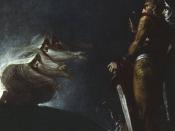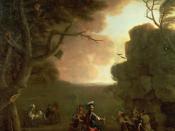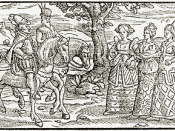Masy Cheung Macbeth Paper Mrs. Kalan Rough Draft Fear, this motivates us to do many things no matter if they are right or wrong. In the play Macbeth it was fear that was the main motivating factor that influenced the outcome of the play. The impacts of fear affecting the many irrational behavior of his shortly came about after Duncan's murder, which then led to the other murders; and why were these committed? It was because Macbeth was scared of being caught and having to pay for the wrongs he had done. Also look at Lady Macbeth, the constant washing of her hands, sleepwalking and other behavior like this. All done out of fear, and like her husband fear of being caught. The majority of Macbeth's actions, were all committed out of fear, not only of being caught but of the witches' prophecies, he was scared of them coming true and tried to stop them from happening.
This whole play was inspired by fear and what it can do to a person. Shakespeare has done a wonderful job at depicting fear and how it would cause people to make poor and irrational behaviors. The concept of fear has not changed, only portrayed through different ways. Shakespeare's ideal of fear not only impacted his time period, but has left a mark on our society and literature.
Macbeth's fears and anxieties arise shortly after the murder of Duncan. Macbeth's fear is starting to consume him, he can no longer sleep and is ravaged by guilt over what he's done. Macbeth, had just killed the King of Scotland and blamed it on Malcolm and Donaldbain. People believed his allegations and he became King. He should have been content with what he has just gain, but instead he led ambition and greed get to the better of him. Keeping in mind of the witches' prophecy, he feared and loathed Banquo for he was the only other witness. The witches foretold that Macbeth would be King, but it would be Banquo's children that would follow after him. This made Macbeth very angry, he risked everything to become King and after him none of his family will follow.
"Only for them; and mine eternal jewel Given to the common enemy of man, To make them kings, the seeds of Banquo kings!" [Act III, S I, L 72-75] Here Macbeth realizes that if something is not done to Banquo, then his sons will become King. Macbeth cannot let this happen, he has already worried that his soul will go to hell for what he has already done. His fear becomes evident in this scene also, "But to be safely thus: our fears in Banquo Stick deep;" [Act III, S I, L 53-54] Macbeth then has Banquo murdered, but Fleance escapes in the attack, which then only proves that he cannot cheat fate. Next Macduff refuses to accept Macbeth as king and flees to England to join Malcom. At this point Macbeth's conscience is plagued with fear and evil. His mind is so consumed that he does not know what to do anymore. So he goes and seeks "guidance" from the witches and they tell him to beware of Macduff, which angers Macbeth and drives him to kill Macduff's family. They also tell him that he may be king now, but Banqo's descendants will gain the throne. More fear of losing the throne, makes Macbeth come up with the conclusion that from this moment on he will start doing anything that comes to his mind and will disregard any consequences.
Lady Macbeth is also being comsumed by fear and guilt, she is slowing losing her sanity. This is a result of her not being able to handle what she has done to Duncan.
"Out, damned spot!out,I say!One;Two:why, then 'tis time to do't. Hell is murky. Fie, my lord, fie! a soldier and afeard? What need we fear who knows it, when none can call our power to account?" [Act V, S I, L 32-35] Here Lady Macbeth is trying to wash out what she sees as being blood on her hands. As well as she mentions hell an obvious fear of going there for what she has done. At the start Lady Macbeth was the one pushing on Macbeth to kill Duncan but as the play goes on she becomes weaker as Macbeth becomes stronger, Macbeth is not troubled by what he has done to the extent Lady Macbeth is. Her role in the play slowly becomes smaller and smaller as she ends up being driven mad by the guilt and soon can no longer take, and ends up taking her own life hoping that her torment will end. "The Queen, my Lord is dead" [Act V, S 5, L 18], Lady Macbeth takes her life right before the battle against the english is about to begin (the demise of Macbeth). This taking of her own life demonstrates her fear and in the end how fear has led her to take her own life.
The witches played a major role in helping to create and spread the fear. They were the main source of fear for Macbeth, after all it was where has he learned everything from. With each new vision, Macbeth falls deeper and deeper into an evil spiral. From the witches first prediction of Macbeth being king, which made Macbeth murder to become king. Upon hearing Banquo's children becoming kings, this scared Macbeth of losing the throne. Also when he went back to see the witches he gained some more knowledge, to beware of Macduff; "Macbeth! Macbeth! Macbeth! beware Macduff; Beware the thane of Fife." [Act IV, S I, L 77], and that all his sacrifices were basically for nothing. Now that Macbeth has heard this, he believes that he must kill Macduff, however he learns that Macduff has fled to England, so Macbeth decides to kill his family. He has put all his faith in the prophecies, and what the witches say must be true because they have been right so far. This definitely ensured Macbeth's tragic ending.
Fear made Macbeth mad for power which he ended up getting. But after the first of his crimes the rest became easier for him, pretty soon he would just order it and not think twice. All through the play his fear of being caught, and the witches prophecies coming true made him commit most of these evil deeds. Fear had become the main movating factor in the play.
Through this play, Shakespeare Resources 1. Literature and the Language Arts : The British Tradition: The EMC Masterpiece Series 2. http://www.britannica.com/dictionary?book=Dictionary&va=fear&query=fear October 20,2001 3. The Tragedy of Macbeth Shakespearean Criticism, Vol. 3. Detroit: Gale Research Company, 1986.
pgs.165-170.
4. Harris, Laurie Lanzen, and Scott, Mark W. ed 5. "The Morality of Murder": Capital Punishment in America by: Mark Krumholz 6. http://www.flandreau.k12.sd.us/~wittj/3fear.htm November 6, 2001





